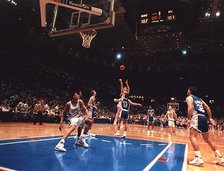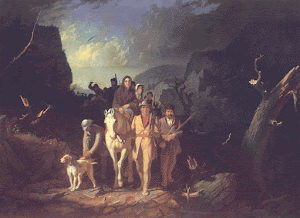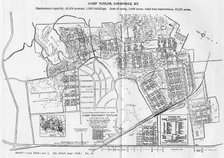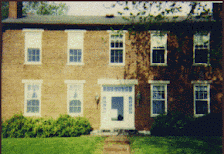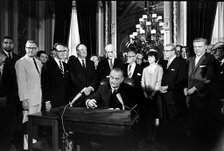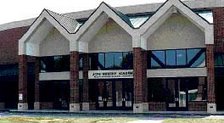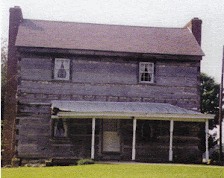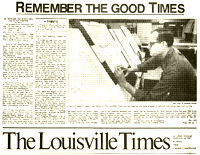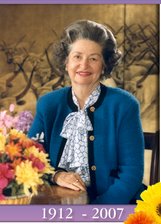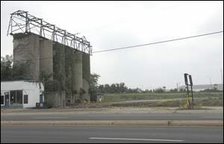Last Sunday morning, before Mass, I walked along the concrete pathway which borders on the Ohio River at Cox's Park. (Technically, it is Carrie Gaulbert Cox Park, but no one calls it that. We all know it as Cox's Park). Although I am rarely out on the water anymore, I love to watch it pass by. When I was younger my family spent time at Herrington Lake, Elmer Davis Lake, and along both the Kentucky and Ohio rivers on the boats of family members. On the Ohio, my step-great grandmother, Margaret "Maggie" Church, was the owner of the biggest house in Bethlehem, Indiana, which was converted to a Bed-and-Breakfast after her passing, and has since been reconverted back to a residence. Overlooking the river, it is formally known as the Abbott-Holloway House, and is a two-story, double pile, brick house built about 1830 in the Federal style. It faces the river, with its back to the small town, a town which finds itself in the news once a year when they open the United States Post Office so people can have their Christmas Cards' postage stamps hand-cancelled in a place called Bethlehem. Bethlehem is in northern Clark County, Indiana, a little upriver from the Oldham/Trimble County line in Kentucky, and about 5 miles downriver from the Clark/Jefferson County (IN) line in Indiana. The easiest way to get there is to go up IN 62 to the town of New Washington (where I have some Hockensmith cousins I don't really know, the children of my grandfather's brother Lee), and then turn right on the New Washington-Bethlehem Road, which follows down the hill to the old town. Another route is to turn off IN 62 a little earlier, at Hibernia, where 62 veers to the left. From there you go straight a few blocks through Hibernia's hand full of homes and trailers, then right on Hibernia Road about 1 mile, to the Charlestown-Bethlehem Road, which winds down the hill and becomes Camp Creek Road. Using this route you arrive at the southern edge of Mamaw Maggie's old homestead just as you enter into town.
Very little has changed in Bethlehem since - well since ever. The town is mostly abandoned. No little markets or churches, no school, no theaters, no stop lights or even stop signs. Only the tiny post office (Zip 47104), a boat ramp, the huge cemetery (where my step-great grandmother and her last husband, Ira Church, are buried), and another seasonal Bed and Breakfast remain. And when I started this little essay, I had no idea or intention that it would lead to Bethlehem. The keyword was to be change. I was going to write about Louisville's resistance to change, another symptom of our general apathy, our general laid back, live-and-let-live attitude which avails the town of change ever so slowly. Much as the water rolling down the river past Cox's Park, it is little unchanged from its earlier course past Bethlehem. And on it goes. (A rather morbid side note - a friend of mine who lives in Louisville but was raised in Paducah has spoken before of the disposal of his remains upon the end of his temporal stay here on Terra Firma. He has asked that after the cremation, his ashes are to be poured into the ever-flowing Ohio River here in Louisville so as to make his final journey home to Paducah, which is also on the Left Bank of the Ohio River, at Milepoint 929). But, I digress. Let me return to Louisville and its agents for change.
I try to imagine where our downtown residential revitalization would be had former Mayor Dave Armstrong not been mayor for the interregnum, 1998-2002, between Jerry Abramson's terms as Mayor of Louisville and Mayor of Louisville-Jefferson County Metro. I didn't support Armstrong in the Democratic Primary in 1998. I helped Tom Owen's campaign, which was managed by a then-local woman named Shannon Hensley, who is now an attorney on the West Coast. In that campaign, we portrayed Armstrong as the "suburban" candidate as opposed to Owen, who is something of an urban icon, with his railroad cap, bullhorn, and straggly beard. But, our portrayal of candidate Armstrong was not matched with the reality of Mayor Armstrong, who proved to be a great shot-in-the-arm for downtown residential development, as well as being a great friend to the Arts community, and others whose interests were civically-centered as opposed to personally-centered.
Under his watch, so much changed in the downtown area, especially along East Market and East Main, that sometimes you had to wonder "is this really Louisville?" Fortunately the momentum Armstrong began has continued in a grand way into the new merged government. The east end of downtown Louisville changes from week to week, a phenomenon heretofore unheard of in this town. But not everything Armstrong started has Abramson finished. One huge project left undone is the Skate Park, at Clay and Franklin streets. There were grand plans for this park, plans which remain plans. Now they are to be overshadowed by a new ramp in the plans for the ever-expanding Spaghetti Junction. I've stated before my objections to the expansion of Louisville's (and Jeffersonville's) downtown highway system, an objection deeply rooted in concerns about Hospital Curve, the sooner-or-later necessary evacuation of thousands of hospital rooms in the Jewish and Norton hospital complexes brought on by wider approaches and hence, increased speeds of drivers heading into what will be a 23-lane wide intersection, if the powers-that-be are as powerful as they have led us to believe. There is an alternative - the 8664 plan, which we've discussed before.
One of the projects that is moving along is the Downtown Arena, an idea first visited upon Louisville when former aldermen Steve Magre and Dan Johnson (Johnson remains on the new Metro Council) teamed up with my old boss, J. Bruce Miller, to find a way for Louisville to pay for a new arena. Their idea was to lure an NBA team to Louisville and have them and their sponsors, including shared NBA television revenues, make the payments, as opposed to assigning the bill to Louisville's taxpayers. Instead, the current Metro Council and Mayor of Louisville-Jefferson County Metro, along with Lexington's biggest entrepreneur Jim Host, and perhaps in collusion with the leadership at the Courier-Journal and Bellarmine University (where I was awarded several hours of credit toward my eventual collegiate degree, back when it was known as Bellarmine College), have decided that the funding for the arena, or at least a large part of it, should be borne by Louisville's taxpayers, both now and for the next 30 years, in the form of covering the bonds to raise at least $206,000,000.00 and maybe an additional $103,000,000.00 for a total of $309,000,000.00. The Council voted on this scheme last night at its meeting and will send their passed ordinance onto the Mayor of Louisville-Jefferson County Metro for his signature. Of the 25 memberss present, two voted No. Doug Hawkins votes "No" on lots of things so his No vote is No surprise. Whenever a vote is some-such-number to 1, rest assured the 1 is Councilman Hawkins. On the other hand, Dan Johnson knows more about how this thing should have been funded than anyone over there along with knowing how it could have been funded. His no vote also lacked surprise. What it didn't lack was integrity.
But spending money to borrow money, up to $309,000,000.00, wasn't the only thing on the agenda last night. There was also the state-law-required vote of the Council to put on this November's ballot a measure which will raise taxes to support the Louisville Free Public Library. I've stated my support of this revenue-enhancement (a Ronald Reagan term) in the past, along with the farther-reaching proposals set out by blogger Moderate Man, a pseudonym for someone who blogs on Paul Hosse's blog called Another Opinion and that of the incumbent County Judge Executive sans portfolio Ken Herndon. But what we heard from several of the councilmembers last night wasn't outright Support of A New Tax Levy, which is what this is, but rather we heard some of them say We Support Allowing the People To Vote on This Tax Levy, or from the other corner, This Levy isn't Needed as We Can Do This Now, but We Are Required By Law to Put This on The Ballot So We Are Voting Yes.
Taking the last argument first, this was the line followed by the Republicans, all of whom are disciples of Grover "No New Taxes" Norquist. But, have you ever heard Grover and his band of followers say "No New Borrowing"? No, you haven't. Borrowing is the new Taxes. Borrowing is apparently the "in" thing. How do you think George W. Bush (with the help of the Democratically controlled Congress) is paying for his War in Iraq? By borrowing. The current debt of the United States of America is $8,902,164,609,127.16, or about $29,424.40 per person, including all the babies born today. Would your bank lend you $29,424.40 today to pay off your part of the loan? Mine won't because they know I'm not really all that good with money. When one isn't all that good with money, one's credit rating falls and borrowing isn't as easy. Imagine the credit rating of the United States of America. Borrowing by the government isn't limited to the Federal government. Our legislators in Frankfort have done it and want to do more. Here in Louisville, we have borrowed for Capital Projects, by way of bonding, in the last few budgets. The vote last night will have us bonding up to $309,000,000.00 more for an arena, paying on the debt through the year 2039, when I will be 78. And when the opportunity comes along for a tax hike that will actually address the money-shortfall, do we hear "Yes, Yes, that is what we need!" No, we hear, "let's let the voters decide and we will follow the will of the voters." In other words, we aren't leading, we are following. We are bringing up the rear, as it were. We weren't elected to lead the government into the future, only to follow the prevailing winds. True leadership is gone with the [prevailing] wind.
At some point, this form of government borrowing and spending must change. But when?
*****
Almost totally unrelated to the above diatribe is an interesting obituary in today's Paducah Sun. It is only interesting in that the name of the deceased is States Rights Aycock, II, a rather unusual name to say the least. It is almost totally unrelated to the above except for two things - 1) it is taken from the Paducah Sun, the local newspaper of the town my friend wants his ashes floated down to; and 2) use of the words States Rights.
That term has a long history with the United States and the 50 sovereign states of which she is made. Some issues of national interest, especially those dealing with civil and human rights, use the arguments made in the McCulloch v. Maryland, 17 U.S. 316 (1819), a landmark United States Supreme Court decision. Essentially, that decision, written by Chief Justice John Marshall, said that the Federal government can override the States on issues of national interest and significance, as long as they are within the confines of the Constitution. States (or more accurately, the voters of a State) are usually far behind the curve on some matters, such as the votings rights of blacks, women, and others; or ownership laws, especially in the Old South; or perhaps when the time comes to raise a tax to support a Library system. Sometimes - this is hard to say and hard to admit - but sometimes the voters are wrong. Sometimes they are voting for the wrong reasons, and when they do the outcomes are also wrong. And in this world of Me First and To Hell With You, a think-style which arose under the Me generation led by Ronald Reagan, the group-speak, group-think horde is simply wrong. It is at that point the leaders should step in their roles as trustees as opposed to representatives, and actually lead as opposed to following.
Mr. Aycock's Obituary.
Friday, July 27, 2007
WICKLIFFE, Ky. — Graveside services for States Rights Aycock II, 73, of Wickliffe will be private.
Mr. Aycock died at 3:15 a.m. Wednesday, July 25, 2007, at his home.
Mr. Aycock retired from the U.S. Army. He was a veteran of the Korean and Vietnam conflicts. In Korea he served with the 17th Field Artillery BN. In Vietnam he served with the 5th S.F. GP Airborne (ATR). Mr. Aycock was a member of Wickliffe Masonic Lodge No. 625, the Scottish Rite, Veterans of Foreign Wars Post 5409 in Bardwell, American Legion Post 0442 in Winchester, Ill., Disabled American Veterans in Paducah, and the Shriners in Madisonville.
Surviving are his wife, Sue Bridgman Grimmitt Aycock; one daughter, Ann M. Bates of Calvert City; two sons, States R. Aycock III of Lovelaceville and Scott Aycock of Reidland; three stepdaughters, Georgia Grimmitt of Kevil, Tina Hicks of Sedalia, and Cindy Slayden of Columbus; one stepson, Mike Grimmitt of Columbus; one sister, Nancy Morris Garner of Jonesville, S.C.; 13 grandchildren; and four great-grandchildren.
He was preceded in death by his first wife, Beverly Kay (Kimsey) Aycock; one sister; and one brother. His parents were Edmund E. and Lula (Fowler) Aycock.
There will be no visitation. Milner & Orr Funeral Home in Wickliffe is in charge of arrangements.
Expressions of sympathy may take the form of contributions to the charity of one’s choice.

